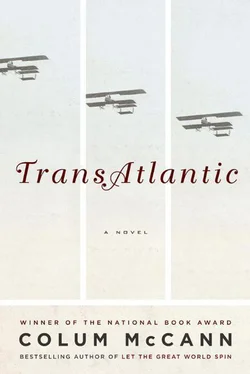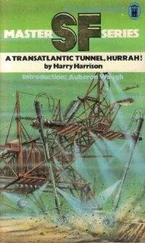He is well aware that there are some out there who think they have him on an endless looping string. The judicial puppet. Peace and Judy. But it doesn’t bother him one bit, even when they draw him, glum and dangling, in one of their crude newspaper cartoons. Or their backhanded jibes. There is something fierce about him: he has earned the right to part the darkness slightly, to go with them into the corners.
What the Irish themselves worry about is that they will somehow keep on delaying, but he will not allow it, the endless riverrun, riverrun, riverrun. He will be over eighty when Andrew goes to college. The father mistaken for the grandfather. The distant ancestry. All those ancient ghosts. There were sixty-one children born in Northern Ireland the day Andrew was born. Sixty-one ways for a life to unfold. The thought slides a sharp blade of regret down the core of his spine. His son is just five months old now, and he can count on just four hands the amount of days he has spent with him. How many hours has he sat in the stark chambers listening to men argue about a single comma, or the placement of a period, when all he wanted was to return to the surprise of his very young child? Sometimes he would watch them as they talked, saying very little or nothing at all. Kites of language. Clouds of logic. Drifting in and out. Caught on the moving wave of their own voices. He heard certain phrases and allowed them to take him out over the treetops, into what the Northern Irish called the yonder. Immersed in the words. Sitting at the plenaries, waiting. The brittleness in the room. The cramped maleness. A relentless solicitude about them, they would hold up a hand and tell people they did not deserve the reverence, but it was plain to see that they needed it.
Some days he wishes that he could empty the chambers of the men, fill the halls instead with women: the short sharp shock of three thousand two hundred mothers. The ones who picked through the supermarket debris for pieces of their dead husbands. The ones who still laundered their gone son’s bed sheets by hand. The ones who kept an extra teacup at the end of the table, in case of miracles. The elegant ones, the angry ones, the clever ones, the ones in hairnets, the ones exhausted by all the dying. They carried their sorrow — not with photos under their arms, or with public wailing, or by beating their chests, but with a weariness around the eyes. Mothers and daughters and children and grandmothers, too. They never fought the wars, but they suffered them, blood and bone. How many times has he heard it? How often were there two ways to say the one thing? My son died. His name was Seamus. My son died. His name was James. My son died. His name was Peader. My son died. His name was Pete. My son died. His name was Billy. My son died. His name was Liam. My son died. His name was Charles. My son died. His name was Cathal. My son’s name is Andrew.
THE RAIN OUTSIDE still hammers down. Luggage carts hurry to and fro. He lifts a biscuit, blows the tea cool. Sunday nights to Ireland. Wednesday nights to London. Thursdays to Washington D.C., at his law firm. Friday nights to New York. Sundays back out to England and Ireland again.
Sometimes it feels as if there is no motion at all: thousands of miles in the decompression chamber, the same cup of tea in the same cup in the same airport lounge, the same city, the same neat car.
He wonders what might happen if the plane were delayed, how easy it would be to go home, ascend in the elevator, to turn the key, flick on the lamp, become that other man on whom he is equally intent.
HE IS GUIDED last onto the plane. A special privilege. As if he could be unseen. A nice thought: to be truly unseen. To own an influential anonymity.
He was always recognized in Washington. The push, the shove, the backslap. The corridors of power. What he disliked were the galas, the garden parties, the red carpets. Flashbulbs, press briefings, TV cameras. The irksome necessities. He was recognized in New York, too, but nobody seemed to care. The city was so brash that it was obsessed only with itself. In Maine, he felt at home, amongst his own people.
Out here, in this nation of cloud and air, they all know him, too. They are quick to hang his suit jacket, place the small bag in the overhead bin. He glances across and is glad to see that the seat beside him is free. No need for the kind nod, or the apologetic half-grin. He has his routine down firmly now. The window seat. Briefcase tucked down beside him. Shoes gently lifted, though not fully taken off, not yet. Something vaguely rude in the idea that you remove your shoes before liftoff.
The stewardess moves along the aisle. A tray, a tongs. He reaches for the white towel, holds it to his brow, and then cleans in the depths between his fingers. How quickly the towel grows cool. For once he wishes he had one of those confounded portable phones. What is it they call them? Cellulars. Mobiles. Handhelds. Just to call home. But his refusal to get a phone has become a point of honor now. He clings to the idea, an old-fashioned beating of the chest. He has spent sixty-odd years without one: no point in beginning now. Ridiculous, really. All his aides have them. His negotiating team. All the reporters. There have even been times, just before takeoff, when he borrowed one from his fellow passengers, just to make a quick call to Heather. His hand over the mouthpiece so as not to appear rude.
A menu is slipped into his lap, but he knows this month’s choices by heart: lobster bisque, garden salad, chicken cordon bleu, Asian noodles, beef tenderloin, mushroom risotto. The British are working on their culinary reputation, it seems. Their best, their brightest. They are a tough, intransigent lot, though they have softened a good deal in the past year or so. Embarrassed by what they have done for centuries in Ireland. Ready to leave. To hightail it out of there. They would wipe their hands clean in an instant, if only they didn’t have to do it in front of the world. They seem stunned that Northern Ireland somehow exists. How did they possibly ever believe that the country could have been good for them? What it all came down to was pride. Pride in the rise, and pride in the fall. They want to be able to leave with a measure of dignity. Tally-ho. Ta-ra. Voyeurs to their own experience. Living at an angle to the moment. And the Irish, down south, with almost the exact opposite dilemma. Embarrassed by the fact that it was taken away. Centuries of desire. Like the longing for a married woman. And now suddenly she is there, within your grasp, and you’re not quite sure whether you want her at all. Second thoughts. Other dowries. The mildew in the room where the past is stored. The Unionists, the Nationalists, the Loyalists, the Republicans, the Planters, the Gaels. Their endless gallery of themselves. Room after room. Painting after painting. Men on tall horses. Flags into battle. Sieges and riverbanks. The alphabet soup of the terrorists.
At first he couldn’t understand the accents. The spiky consonants. Angular and hard-edged. It seemed to him like an altogether different language. They came to the microphone. He had to lean forward to try to decipher it. The small punctuations of grief. Ach. Aye. Surely. Not our fault, Mr. Chairman. Six into twenty-six won’t go. They kicked the bloody door in, so they did. They pushed wee Peader out the helicopter. All due respect, Senator, we don’t talk to murderers. If Mr. Chairman would like to know what it’s like why don’t you come, for once, to the Shankill?
They were dumping out the contents of endless drawers on the floor. But he soon caught on. He began to tell the difference between a Belfast and a Dublin accent, between Cork and Fermanagh, between Derry and Londonderry even. All the geography that went into words. The history behind every syllable. The Battle of the Boyne. Enniskillen. Bloody Sunday. There was a clue in every tiny detail. Gary was a Prod. Seamus was a Taig. Liz lived on the Shankill Road. Bobby on the Falls. Sean went to St. Columba’s. Jeremy to Campbell. Bushmills was a Protestant whiskey. Jameson for Catholics. Nobody drove a green car. Your tie was never orange. You went for holidays in Bundoran or you went to Portrush. Fly your flag. Pick your poison. Choose your hangman.
Читать дальше












